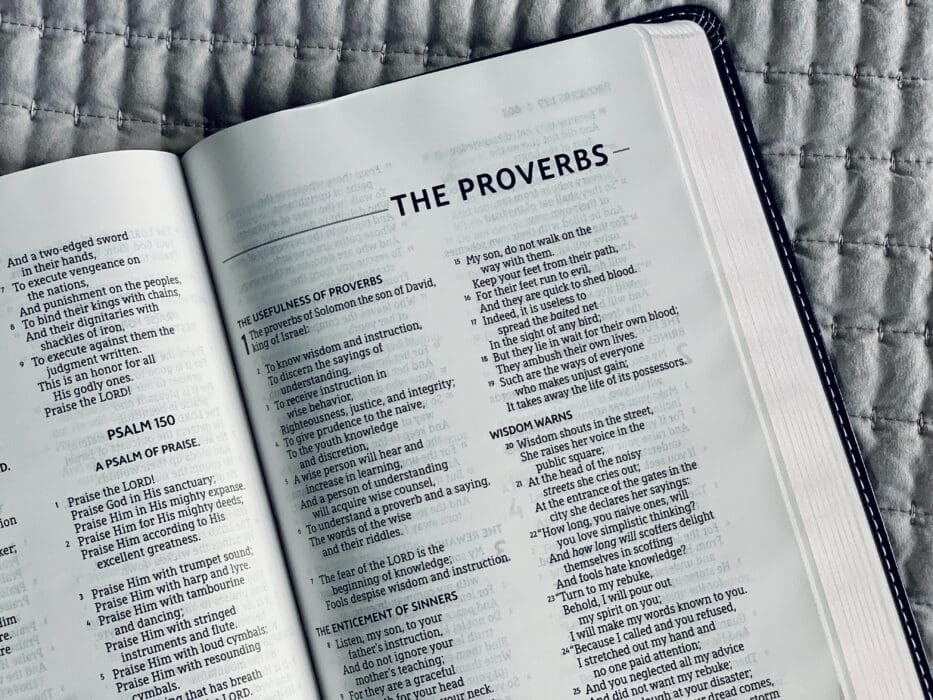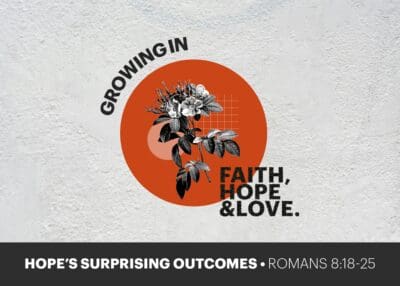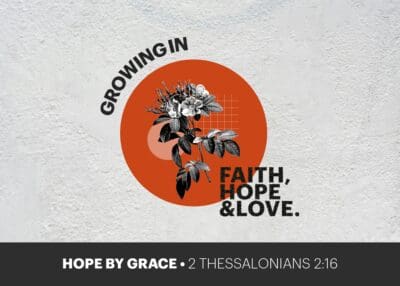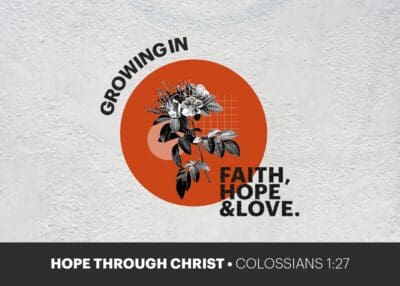Please open your Bible at Hebrews 11 as we continue our series, Living By Faith. We are looking today at the story of Joseph.
Again, the scene that God has chosen to teach us what faith looks like, comes right at the end of Joseph’s life. “By faith Joseph, at the end of his life, made mention of the exodus of the Israelites and gave directions concerning his bones” (Heb 11:22).
Of all the scenes from Joseph’s life, this seems a surprising selection. When you think about the story of Joseph you might expect to read, “By faith, Joseph resisted temptation.” “By faith, Joseph interpreted dreams.” “By faith, Joseph forgave his brothers.” “By faith, Joseph saved his family by providing food in the famine.”
But these are all passed over, and the Holy Spirit has recorded the arrangements Joseph made for his burial as his greatest act of faith.
Last week we saw that where there is faith, there will be worship. Today we’re going to see that where there is faith, there will be hope. The Scripture we are looking at today speaks to a question that I think weighs heavily on all of our minds.
What does the future hold for God’s people?
The Bible makes it clear that life for God’s people goes through different seasons. You see this in the story of Joseph. There were years that he had to endure, there were years that he could enjoy.
The same will be true of us. There are times to be enjoyed, and there are times to be endured.
When we see the world around us changing, we all wonder: “What does the future hold for our children and for our children’s children? Will they know times to be enjoyed or times to be endured?”
This was the question facing Joseph at the end of his life. The family God had chosen to bless were living in Egypt. What did the future hold for them there?
Hebrews tells us that when Joseph faced this question, he exercised faith and because he exercised faith, he had hope. Faith is like a tree bursting with fruit, and hope is the fruit of faith that Hebrews draws out from the life of Joseph. Where there is faith, there will be hope.
Please turn to Genesis 50, where we find a beautiful picture of a family finally at peace.
After Jacob died, Joseph’s brothers feared that he might pay them back for the evil they had done to him (vs. 15). But Joseph had forgiven them, and he wept because they did not believe him, (v17).
He said “You meant evil against me, but God meant it for good” (vs. 20).
Then he said, “So do not fear; I will provide for you and your little ones.” Thus he comforted them and spoke kindly to them” (Gen 50:21).
At the end of Joseph’s life everything was picture perfect for the people of God. The brothers enjoyed a time of blessing greater than they had ever know before. The chosen family was united at last. Everything they needed was provided. And they had nothing to fear.
The smile of the culture was on God’s people. Joseph was loved in Egypt! His brothers could bask in the reflected glory that came with being his relatives. Genesis tells us that when Jacob died, “the Egyptians wept for him seventy days” (Gen 50:3). That gives you some sense of the affection in which this family was held.
You look at the blessings that the chosen family enjoyed at the end of the book of Genesis and you feel, “if only it could be like this forever.” There will be times in your life, when you say, “I wish I could hold onto this forever.” And of course you never can. Life moves on. Things change. And not always for the better. So, as we come to the end of the book of Genesis, the obvious question is, What does the future hold for the family of God?
There are three answers to that question.
First, there will be:
i. A Time Of Growth
“Then Joseph died, and all his brothers and all that generation. But the people of Israel were fruitful and increased greatly; they multiplied and grew exceedingly strong, so that the land was filled with them” (Ex 1:6-7).
God multiplied his people. When Jacob arrived in Egypt, the entire family were just 70 people. When they left Egypt they were around 2 million.
God’s people flourished in Egypt. The multiplied. They prospered.
This is true in our own lives and in the life of the church. There will be times of growth when we must seize every opportunity we can. Jesus said, “We must work…while it is day; night is coming, when no one can work” (Jn 9:4).
First, there was a time of growth. But God had already revealed to Abraham that the future would hold a time of trial.
ii. A Time Of Trial
“Know for certain that your offspring will be sojourners in a land that is not theirs and will be servants there, and they will be afflicted for four hundred years” (Gen 15:13).
This must have been hard for Joseph to imagine. How could it be that in Egypt, where God’s people are loved and respected, they would become slaves? How could they be afflicted in the land where they had been so richly blessed? And how could this last for four hundred years?
The world is constantly changing, and Joseph believed what God had revealed to Abraham.
“Your offspring will be sojourners…and they will be afflicted for four hundred years.”
And so it was. We read in the book of Exodus, “Now there arose a new king over Egypt, who did not know Joseph. And he said to his people, “Behold, the people of Israel are too many and too mighty for us…” Therefore they set taskmasters over them to afflict them with heavy burdens” (Ex 1:8, 9, 11).
The great oppression began. The culture no longer smiled on God’s people. But here’s what I want you to notice: God continued to bless His people during this time of trial. “But the more they were oppressed, the more they multiplied and the more they spread abroad” (Ex 1:12).
The God who blessed them in the time of growth, continued to bless them in the time of trial. God is always with His people, and God is always for His people.
What does the future hold for God’s people? There will be times of growth and there will be times of trial.
How could God’s great purpose to bring His people into the Promised Land be fulfilled if they were oppressed in Egypt?
iii. A Time Of Deliverance
God had said to Abraham, “But I will bring judgment on the nation that they serve, and afterward they shall come out with great possessions” (Gen 15:14).
The world around us is always changing, but faith looks beyond the changing moods of the culture. Like Abraham, we are looking for a heavenly city (Heb 11:10,16). God’s people know that however much we are blessed in this life, His plan for us cannot be fulfilled here.
Here’s the future: There will be times of growth. There will be times of trial. And there will a time of deliverance. And this is what Joseph spoke about at the end of His life.
Hebrews tells us that, “By faith Joseph, at the end of his life, made mention of the exodus of the Israelites…” (Heb 11:22). These last words of Joseph are recorded for us in Genesis 50. They are full of hope: Hope while we live and hope when we die.
1. Hope While We Live
“And Joseph said to his brothers, “I am about to die, but God will visit you and bring you up out of this land to the land that he swore to Abraham, to Isaac, and to Jacob” (Gen 50:24).
Joseph was speaking here as a prophet, so what he said was the Word of God. Through all the years of oppression in Egypt, this was the hope of God’s people: God will visit you. God will bring you up out of this land. God will come down from heaven and He will deliver you.
That is exactly what happened. God visited His people. He revealed Himself to Moses. Then Moses and Aaron told the people what God had said, “I have come down to deliver them out of the hand of the Egyptians” (Ex 3:8). God brought them up out of Egypt and into the Promised Land.
When God’s people came into the Promised Land, they enjoyed times of growth. They endured times of trial. And they looked to God for a time of deliverance.
The prophets spoke of a day when God would come down and deliver His people. Through all the years of the Old Testament, this was the hope of God’s people: God will visit you.
And that is exactly what happened. God has visited us in Jesus Christ. The Word became flesh and lived among us.
Luke records a day when Jesus came to the town of Nain. A funeral procession was leaving the city. A widow was grieving the loss of her only son, and Jesus had compassion on her. He stopped the procession and said, “Young man, I say to you arise.” Scripture records that he sat up and began to speak. The people were terrified and said, “Surely God has visited his people” (Lk 7:16).
Here we are today: 2000 years have passed since Jesus died and rose, and ascended into heaven.
Through these long years, the church has enjoyed times of growth and endured times of trial.
Through all these years, this has been her hope: God will visit you.
“The Lord himself will descend from heaven with a cry of command, with the voice of an archangel, and with the sound of the trumpet of God. And the dead in Christ will rise first. Then we who are alive, who are left, will be caught up together with them in the clouds to meet the Lord in the air, and so we will always be with the Lord” (1 Thess 4:16-17).
Our exodus is coming. God will visit you. This is what He has done in Christ. This is what He will do in Christ. And because we believe we have hope.
2. Hope When We Die
“By faith Joseph, at the end of his life…gave directions concerning his bones” (Heb 11:22).
Why would this be so important to Joseph? Why would it make any difference where he was buried?
It is clear from the book of Hebrews that the patriarchs believed in the resurrection. Abraham considered that God was able even to raise Isaac from the dead (Heb 11:19). God could raise the body of Joseph from a plot of ground in Egypt as easily as from a plot of ground in Canaan or anywhere else.
But Genesis tells us that Joseph made the sons of Israel swear, saying, “God will surely visit you, and you shall carry up my bones from here” (Gen 50:25).
There must be something important about this, because Jacob also asked that his body be taken to the Promised Land: Jacob said to Joseph, “Do not bury me in Egypt, but let me lie with my fathers. Carry me out of Egypt and bury me in their burying place.” He answered, “I will do as you have said.” And he said, “Swear to me”; and he swore to him. Then Israel bowed himself upon the head of his bed” (Gen47:29-31).
This really mattered to Jacob. And it mattered to Joseph. He made his brothers swear an oath that when God’s people went to the land of Canaan they would take the bones of Joseph with them. And Hebrews regards this as the great act of Joseph’s faith. Why?
Remember that in the Old Testament, God teaches us in pictures. The Old Testament is God’s book of visual aids. God uses things that we can see to help us grasp the invisible. God uses what we can touch to help us grasp the spiritual. God uses things in time to help us grasp the eternal.
God had chosen a land that He would bless, and the blessed land on earth points us to the blessed life of heaven. Abraham knew that the Promised Land was pointing forward to something greater than could ever be found in this world. That is why it says that he was looking for a heavenly country (Heb 11:16).
“The city whose designer and builder is God” (Heb 11:10).
So, when Joseph gave directions concerning his bones, he was saying: “When I die, I will enter into all that God has promised. And as a sign of that, I want you to take my bones to the Promised Land.”
So, the bones of Joseph were kept and carried as a sign of hope. It is not just the living who will enter into what God has promised. Those who have died in faith will enter into what God has promised too.
Joseph was laid to rest in a coffin marked “destined for the Promised Land.”
Joseph’s coffin was a sign of hope. Joseph had said, “you shall carry up my bones from here.” So, during these long years of oppression in Egypt, God’s people could look at the coffin, destined for the promised land and say, “He’s going there, and that means that one day we’re going there too.”
We too have a sign of hope. It is not coffin filled with bones. It is an empty tomb! Jesus Christ is risen.
He is ascended. He is already in the Promised Land, and because He is there, we will be too.
The directions given by Jacob and Joseph point to two wonderful and complementary truths that are the hope of all believers when we die.
When Jacob died, his body was taken straight to the promised land.
“So, Joseph went up to bury his father. With him went up all the servants of Pharaoh, the elders of his household, and all the elders of the land of Egypt, as well as all the household of Joseph, his brothers, and his father’s household” (Gen 50:7, 8).
This must have been the longest funeral procession ever. And they carried the body of Jacob all the way from Egypt to Canaan.
When Jacob died, his body was taken straight to the Promised Land.
The story of Jacob reminds us that believers who die enter immediately into God’s promised rest.
Death separates the soul from the body. And for the believer, to be away from the body is to be at home with the Lord (2 Cor 5:8).
The thief on the cross said to Jesus, “Remember me when you come into your kingdom.” But Jesus said to him, “Today you will be with me in Paradise.”
Get this settled in your mind: The souls of those who die in faith are taken immediately into the conscious enjoyment of the presence of God.
The body of your believing loved one is laid to rest here, ashes to ashes, dust to dust but the soul of your believing loved one is at home with the Lord. That is pictured by the fact that when Jacob died, he was taken straight to the Promised Land.
With Joseph it was very different: The body of Joseph was taken to Canaan a long time after he died.
God’s people were in Egypt 400 years. And the body of Joseph remained there with them, until the exodus. Then we are told that, Moses took the bones of Joseph with him, for Joseph had made the sons of Israel solemnly swear, saying, “God will surely visit you, and you shall carry up my bones with you from here” (Ex 13:19).
The body of Joseph was not taken to the Promised Land until all of God’s people arrived there.
The story of Joseph reminds us that believers will enter into the full joy of all that God has promised together
What happens to a believer after death is like a two stage journey. At the moment of death, Christ will bring your soul immediately, consciously and joyfully into His presence in heaven. To be away from the body is to be at home with the Lord. And that will be better by far than any joy you can know in this life.
But that is not the end of the story. Even then, the best is yet to be.
When Christ returns, those who are with Him will be clothed with resurrected bodies, adapted for everlasting life in the new heaven and earth where we will enjoy the presence of God forever.
Nancy Guthrie uses an illustration that I have found it really helpful. “When we’re going on a trip to Paris, we have a stopover at the Atlanta airport. We don’t spend our time talking about all the things we’re going to do at the Atlanta airport. Our hearts and minds are filled with all that awaits us in our ultimate destination: Paris. [1]
Believers who have died are on a stopover. They are with Christ. But like us, they are waiting and looking for the day when Christ will return in glory. Then we will enter into the full joy of all that God has promised together.
Conclusion
So, here’s what we learn from the story of Joseph. Faith hopes in God. If we have faith we will have hope
Hope while we live. Hope when we die.
i. Where There Is Faith There Will Be Hope
“Faith is the assurance of things hoped for, the conviction of things not seen” (Heb 11:1). “We have been born again into a living hope through the resurrection of Jesus Christ from the dead” (1 Pet 1:3). “Always be ready to give a reason for the hope that is in you” (1 Pet 3:15).
Paul prays that the eyes of your hearts will be enlightened, “that you may know what is the hope to which he has called you” (Eph 1:18).
Scripture calls us to live self controlled and godly lives as we wait for “our blessed hope, the appearing of the glory of our great God and Savior Jesus Christ” (Titus 2:13). “So, we rejoice in hope of the glory of God” (Rom 5:2).
Where there is faith there will be hope.
ii. If We Would Have Hope We Must Exercise Faith
When a storm hit the disciples in their boat on the lake, Jesus asked them, “Where is your faith?”
I don’t know about you, but I feel the challenge of that question. It is so easy to live in fear. When the world changes, God’s people must exercise faith. And we need to hear these words of Scripture: “God will visit you.”
What does the future hold for God’s people? There will be times of growth to enjoy. There will be times of trial to endure.
But most of all, a time of deliverance will come. The future is glorious for all who have faith in the Lord Jesus Christ.
—
[1] From personal correspondence with Nancy Guthrie.
[elementor-template id=”128476″]







